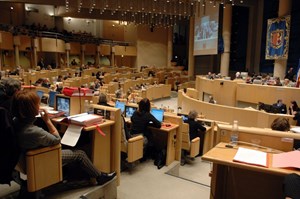ITER NEWSLINE
122
PACA Region elects new council
Robert Arnoux
PACA Region elects new council

A plenary session of the 123-member Regional Council at the PACA Region seat in Marseille. © La Provence
On Sunday 14 and Sunday 21 March, French voters will elect the Councils that govern the 26 administrative regions of the country—22 in mainland France and 4 overseas. Regional Councilmen are elected in a two-round, closed-list proportional representation process. They in turn elect the President of the Region, who will head the regional executive body for six years.
Regions are the most recent among French administrative divisions. They were created in 1972 as consultative bodies, and only acquired limited executive power through the 1982-1983 "decentralization laws." They have much less autonomy however than a German Bundesland, a Spanish provincia or a Swiss canton.
Typically, a mainland French Region includes two to eight départements, with territory that usually corresponds to that of a historical province. There are many exceptions however. The Provence-Alpes-Côte-d'Azur (PACA) region, for instance, includes the whole of the ancient county of Provence, but also the former Papal States, county of Nice and the southern part of the Dauphiné province.
A region does not have authority over the départements it includes within its boundaries—the responsibilities of the two bodies are quite distinct. Roads, school transportation, public assistance, and the building and maintenance of collèges (junior high schools) all fall under the jurisdiction of départements; professional training, transportation, the building and maintenance of lycées (senior high schools), rural planning and development are among the responsibilities of the Région. The Bouches-du-Rhône département, for instance, finances the better part of the ITER Itinerary, whereas the construction of the International School in Manosque, which comprises a lycée, was the work of the PACA Region.
PACA is one of the largest and most populated French administrative regions (4.8 million inhabitants). With a Gross Domestic Product per capita of EUR 28,000, it is also the third "richest," after the Ile-de France (Paris) and Rhône-Alpes (Lyon) regions. PACA, which may soon change its name to a simpler "Provence," is headed since 1998 by Michel Vauzelle, a former Minister of Justice (1992-1993) and Mayor of Arles (1995-1998).
How does the PACA region work?
return to Newsline #122


